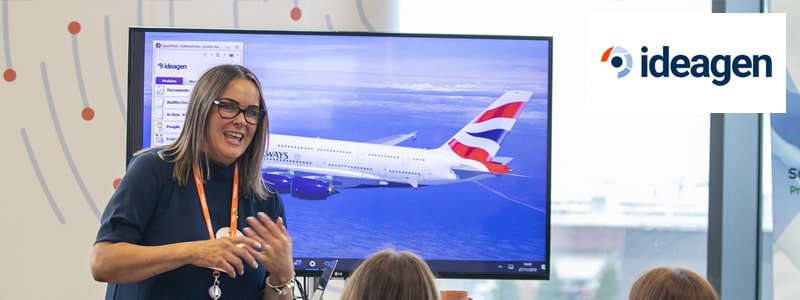Baronsmead VCTs
Offer closed – Register your interest
The most recent Baronsmead VCTs share offer closed on 2 April 2024.
Please register your interest below in the next Baronsmead VCTs offer.
Alternatively, see current VCT offers.
Register your interest – Baronsmead VCTs
Get free VCT alerts and be notified of the next share offer/
Baronsmead Venture Trust (BVT) was one of the first VCTs to launch in 1995, with Baronsmead Second Venture Trust (BSVT) following in 2001. Today the two trusts are among the largest and most diverse of all Venture Capital Trusts.
Combined, they have net assets of around £390 million (October 2023) and a portfolio of more than 85 companies spread across legacy management buyout (MBO) investments, AIM-quoted companies and early-stage growth investments, as well as three Gresham House equity funds and two money market funds.
The VCTs target an annual dividend of 7% of net asset value (NAV) – one of the most generous policies in the market – and have achieved this in each of their last five financial years. Dividends are variable and not guaranteed. Over the five years to 31 December 2023, the VCTs generated a NAV total return (including dividends reinvested) of 2.4% (BVT) and 7.0% (BSVT) respectively: note past performance is not a guide to the future.
- Seeking to raise up to £30 million with an overallotment facility of £20 million
- Targets an annual dividend of 7% of NAV – variable and not guaranteed
- Minimum investment: £5,000
Important: The information on this website is for experienced investors. It is not a personal recommendation to invest. If you’re unsure, please seek advice. Investments are for the long term. They are high risk and illiquid and can fall as well as rise in value: you could lose all the money you invest.
Review: Baronsmead VCTs
Below is our review of the most recent Baronsmead VCTs share offer, which reached capacity in March 2024 having raised £50 million including overallotment.
The manager
The Baronsmead VCTs are managed by alternative asset specialist Gresham House.
The manager is also responsible for the Mobeus VCTs as well as a range of other investment mandates – including strategic public equity, private equity, forestry, renewable energy, housing and infrastructure – overseeing a total of £8.3 billion (June 2023).
In July 2023, Gresham House announced it had agreed to be acquired by private equity firm Searchlight Capital. The deal was given FCA approval in October 2023.
Gresham House’s experienced team of 30, including more than 20 investment professionals, will continue to be responsible for all aspects of portfolio management and investment strategy for the VCTs.
The team is led by Trevor Hope, Chief Investment Officer (Private Equity), and Ken Wotton, Managing Director (Public Equity). Together, the team oversees £753.1 million across the Mobeus and Baronsmead VCTs (September 2023).
Investment strategy
Since 2015, Baronsmead has invested in a mixture of private and AIM-quoted growth capital opportunities. The portfolio also includes a sizeable allocation to legacy investments, such as management buyouts, Gresham House UK equity funds and other main market listed equities.
Across both private and AIM-quoted investments, the VCTs seek to back companies with strong growth momentum, high-quality management teams, proven and profitable unit economics and a scalable sales model. The manager typically invests in businesses with annual recurring revenue of £1 million or more.
Investee companies are split into three stages of maturity – emerging, developing, and core – which will help determine the size of the investment. This helps Baronsmead manage risk and create future deal flow for the VCTs if successful investee companies mature.
Portfolio overview
Combined, the two VCTs have net assets of £390 million (October 2023) and a well diversified portfolio of more than 85 companies.
35% of the combined portfolio is invested in quoted companies and 25% in unquoted companies. The remainder is split across three equity funds (LF Gresham House Micro Cap, LF Gresham House Multi Cap Income, and LF Gresham House UK Smaller Companies, collectively 31%) and cash (9%).
Investments are spread across four sectors: technology (62%), healthcare & education (21%), business services (10%), and consumer markets (7%).
In the six months to 31 March 2023, the VCTs invested in two new and three follow-on opportunities.
Combined portfolio asset class breakdown (%)
Source: Gresham House, October 2023
Combined portfolio sector breakdown (%)
Source: Gresham House, October 2023
Examples of portfolio companies
 Cerillion — largest holding (AIM-quoted)
Cerillion — largest holding (AIM-quoted)
Cerillion provides software to telecom companies to help them with customer engagement and billing – all vital to support the business operations, revenue delivery and pipeline of its clients. The company was founded in 1999 following the management buyout of the in-house customer care and billing product division of Logica, an international IT and management consultancy.
From six customers in 1999, the company has grown to more than 80 customer installations worldwide, and now delivers a broad range of cloud solutions (SaaS), managed services and on-premise enterprise software.
In the five years to FY 2023, the business has grown revenues from £18.8 million to £39.2 million. In its 2023 full-year results, Cerillion reported revenue growth of 20%, driven by a combination of new customer wins and continued demand from existing customers.
The VCTs first backed Cerillion in November 2015, investing a combined £4 million. Cerillion is currently the largest holding in both portfolios, with a total position value of £44.2 million (October 2023). Past performance is not a guide to the future.
 Cognassist – recent investment
Cognassist – recent investment
Developed with neuropsychologists, Cognassist is a neuro-inclusion platform currently helping over 150 UK’s employers, universities, colleges and learning providers.
It helps educators and tutors identify hidden learning needs, personalise support and transform learner attainment. It also helps employers track and manage neurodiversity across their organisation, get the most out of their workforce while addressing issues of inclusion for neurodiverse staff.
Management sees this as a key growth driver, with neurodiversity tribunals having increased by 33% last year alongside greater legal responsibilities for employers. Cognassist has completed 220,000 assessments and provided neurodiversity training to 7,000 employees.
Cognassist was founded in 2017 by Chris Quickfall, a serial entrepreneur who had previously led a number of businesses in the education sector. The Baronsmead VCTs invested £1.8 million in April 2023.
Exit track record
In their last full financial year, the VCTs reported six full exits and one partial. Of these, three were positive, three negative, with one write-off. This delivered combined proceeds of £47.7 million at an average return of 2.1x investment cost. Please note, past performance is not a guide to the future.
 Ideagen – example of previous exit
Ideagen – example of previous exit
Based in Nottingham, Ideagen provides software and services to highly regulated industries such as aviation, banking, and healthcare.
Over the last 10 years, Ideagen has become one of the world’s quickest-growing companies, completing 27 acquisitions. Globally, it now has more than 11,000 clients, including Heineken, British Airways, and the Bank of New York.
Ideagen was admitted to AIM in July 2012 and the Baronsmead VCTs invested shortly after, becoming one of its largest shareholders. In the following years, Ideagen continued to grow, with revenues rising from £4 million (FY12) to £90 million (FY22) and increased EBITDA to over £30 million from breakeven over the same period.
In July 2022, Ideagen was acquired by Hg, a leading software and services investor, in a deal valued at over £1 billion. The exit returned proceeds of £17.1 million, equivalent to a 13.5x return on cost for the VCTs. Past performance is not a guide to the future.
Rainbird Technologies – example of previous failure
As is to be expected, not all investments worked out. Rainbird Technologies, an intelligent automation platform, is an example.
Rainbird was founded in 2013 by James Duez and Ben Taylor. The company designed its own visual platform to help automate complex decision-making processes without the need for code.
However, development of the technology and sales traction took longer than originally anticipated and the VCTs were unwilling to provide further investment. The trusts invested a total of £1.5 million into the business in 2019 and fully exited the position when the business was subsequently sold in 2022. The sale generated no return for investors.
Performance and dividends
Over the five years to 31 December 2023, the VCTs generated a NAV total return (including dividends reinvested) of 2.4% (BVT) and 7.0% (BSVT) respectively. Past performance is not a guide to the future. Note, we show VCT returns over a five-year period as a minimum, where possible. Where a VCT has followed the same investment strategy for longer, we also show returns over 10 years.
Recent performance has been impacted by turbulence within the UK stock market and a challenging macroeconomic environment, resulting in several write downs within both the quoted and unquoted portfolios.
The current policy is to pay dividends twice yearly. When setting the dividends for the financial year, the board will use 7% of opening net asset value in the current financial year as a guide. Over the five years to December 2023, the VCTs have paid out 31.5p (BVT) and 35.3p (BSVT) in dividends per share, equivalent to 38.3% and 43.5% of the starting NAV respectively. Please note dividends are variable and not guaranteed.
NAV and cumulative dividends per share over five years (p)
Source: Morningstar. Past performance is no guide to the future. Dividends are variable and not guaranteed. The bar chart shows net asset value and cumulative dividends per share for the period 31/12/2018 to 31/12/2023.
Dividend payments in the calendar year
Source: Morningstar. Past performance is not a guide to the future. Dividends are not guaranteed. The graph shows the dividends paid per calendar year to 31/12/2023.
Dividend yield history (% of starting NAV)
| Baronsmead Venture Trust | Baronsmead Second Venture Trust | |
|---|---|---|
| 2019 | 9.1% | 9.2% |
| 2020 | 8.2% | 11.7% |
| 2021 | 8.4% | 8.1% |
| 2022 | 8.0% | 7.6% |
| 2023 | 7.2% | 7.9% |
Dividend reinvestment plan
There is a dividend reinvestment plan which allows shareholders to reinvest future cash dividend payments by purchasing existing shares in the secondary market. As these are not new shares they will not be eligible for income tax relief.
Share buyback policy
The boards intend to buy back shares at up to a 5% discount to the prevailing net asset value. This is not guaranteed – please see the offer documents for details.
Discount history
VCT shares are traded on the London Stock Exchange. Similar to investment trusts, the share price can fluctuate and can be different from the VCT’s net asset value (NAV), i.e. the value of the VCT’s underlying investments. The difference between the share price of a VCT, and its net asset value per share, is called a discount.
Based on data from Morningstar, the average discount to NAV as at 31 December 2023 was -4.10%. Over the previous five years the average discount to NAV was -5.80%.
The discount history is based on the closing share price of the VCTs at the end of each month, divided by the latest net asset value at the time. Past performance is not a guide to the future. Investors looking to sell their VCT shares may get a better price using the VCTs’ share buyback facilities, although this is not guaranteed.
Risks – important
This, like all investments available through Wealth Club, is only for experienced investors happy to make their own investment decisions without advice.
VCTs are high-risk so should only form part of a balanced portfolio and you should not invest money you cannot afford to lose. They also tend to be illiquid and hard to sell and value. Before you invest, please carefully read the Risks and Commitments and the offer documents to ensure you fully understand the risks.
To retain the tax benefits, VCTs should be held for at least five years. If you sell VCT shares and reinvest in new shares of the same VCT (including any mergers) within six months, tax relief can be restricted. Tax rules can change and benefits depend on circumstances.
The VCTs have significant exposure to AIM. AIM shares can be very volatile and could suffer extreme volatility if the market falls sharply. The difference between the buying and selling price of AIM-quoted companies is often wider than those listed on the main market.
Charges and savings
A summary of the main charges and savings is shown below. The net initial charge shown includes the Wealth Club saving and any early bird discount. The investment may have additional charges and expenses: please see the provider documents including the Key Information Document for more details, offer price and share allotment calculation methodology.
Please note, capacity – for the offer or any early bird savings – can be reached early, and we may not be notified of this by the VCT in real time.
| Full initial charge | 4.5% |
| Early bird discount | — |
| Wealth Club initial saving | 1.5% |
| Existing shareholder discount | — |
| Net initial charge through Wealth Club (new investors) | 3.0% |
| Net initial charge through Wealth Club (existing investors) | 3.0% |
| Annual management charge | 2.0% (BVT), 2.5% (BSVT) |
| Annual administration charge | — |
| Performance fee | 10% |
| Annual rebate from Wealth Club (for three years) | 0.10% |
More detail on the charges
Annual rebate when you invest through Wealth Club
The VCT includes an annual rebate for Wealth Club investors, payable for the first three years. This is a rebate of our renewal commission and should be equivalent to a percentage (shown in the table above) of the Net Asset Value of the Offer Shares issued to you when you invest. Terms and conditions apply.
Deadlines
The offers are now fully subscribed.
Our view
The two Baronsmead VCTs are amongst the largest and most diversified of all venture capital trusts. The combined portfolio is spread across AIM-quoted companies, legacy MBO investments, newer early-stage growth investments, three Gresham House equity funds, and money market funds.
The VCTs target an annual dividend yield of 7% of NAV – one of the most generous policies in the market – and have achieved this in each of the last five financial years, although past performance is not a guide to the future. These returns have historically been supported by income from legacy investments, such as MBOs and UK equities. However, as the growth capital portfolio continues to expand, dividends are likely to become lumpier and more reliant on exit proceeds.
The Mobeus acquisition has been beneficial in our view, with both teams now fully integrated, sharing deal flow, resources, and expertise. In turn, this should help improve the VCTs’ access to unquoted companies and management teams.
In our view, the Baronsmead VCTs are a high-quality offer that gives investors exposure to the UK stock market and a burgeoning portfolio of growth capital investments. Experienced investors should form their own view.
How to invest
The most recent Baronsmead VCT offer closed in April 2024.
Please register your interest to be alerted when the next offer opens, potentially in the 2024/25 tax year.
Alternatively, see VCT offers available now.
Wealth Club aims to make it easier for experienced investors to find information on – and apply for – investments. You should base your investment decision on the offer documents and ensure you have read and fully understand them before investing. The information on this webpage is a marketing communication. It is not advice or a personal or research recommendation to buy any of the investments mentioned, nor does it include any opinion as to the present or future value or price of these investments. It does not satisfy legal requirements promoting investment research independence and is thus not subject to prohibitions on dealing ahead of its dissemination.
The details
- Type
- Generalist
- Target dividend
- -
- Initial charge
- -
- Initial saving via Wealth Club
- -
- Net initial charge
- -
- Annual rebate
- -
- Funds raised / sought
- £50.0 million / £50.0 million
- Deadline
- CLOSED
